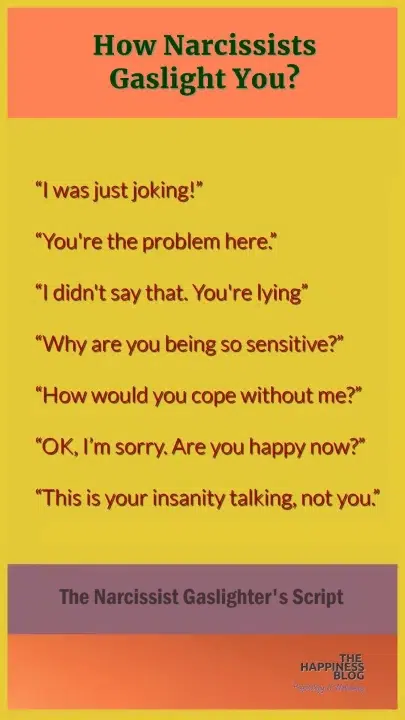Today's Saturday • 7 mins read
— By Dr. Sandip Roy.
Gaslighting is a type of mental abuse.
It is a deliberate act, and they fully intend to distort your own version of reality, using a web of lies, falsification of facts, and word salad.
Successful gaslighting drowns you in self-doubt, making you question why, when, and where your memories and life events happened.
And when you argue against or confront your gaslighter with evidence, they will use more gaslighting phrases like, “You’re imagining things.”
Over time, you lose your self-confidence and self-esteem. And become dependent on your gaslighter to verify the truthfulness of an event, memory, or belief:
“I think my friend Sheila was here on Wednesday, right? I am so confused these days!”
Thus, the gaslighter creates an acute power imbalance in the relationship. This helps them to show the world that you have false illusions and delusions, are helpless by yourself, and are losing your mental sanity.
Ultimately, they want you to ask yourself,
“Am I going crazy?”
Gaslighting Phrases Used By Classic Gaslighters
A gaslighter mainly tries to psychologically manipulate you into distrusting yourself. These are some of their favorite phrases:
“I never said that.”
The denial statements by a gaslighter mean to plant doubts in the victim’s mind. They want to impress upon their victim that they are “putting words into their mouth” and imagining things they never said.
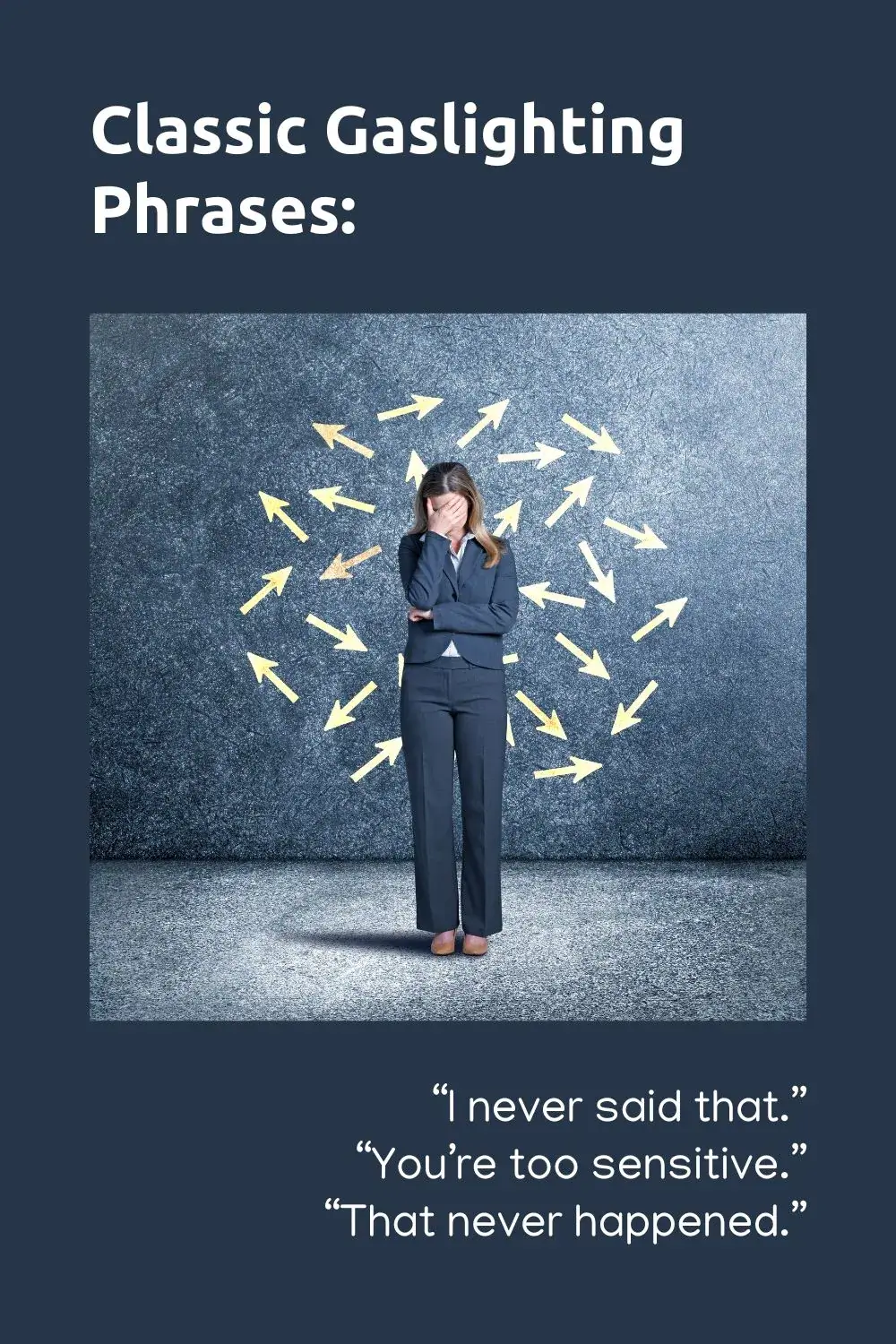
“You’re too sensitive.”
When the gaslighter says, “You’re too sensitive,” he means to shift his blame to his victim. It’s a clever ploy to make the victim doubt and question their own emotions and reactions.
By dismissing their feelings as an overreaction or being “too sensitive,” the gaslighter invalidates the victim’s experiences and perceptions, making it easier to manipulate and control them.
They also insinuate that the victim should not feel snubbed, but instead accept those criticisms as “normal” people.
“That never happened.”
It is a blatant denial, often expressed with an air of surprise and anger.
These statements are designed to make the victim doubt their own eyes, ears, and memory of events.
This rejects the victim’s reality outright, and plants seeds of uncertainty and self-doubt in the victim’s mind. The victim gradually loses her self-confidence to express her experiences and recollections.
That is the key goal of the gaslighter—make the victim less trusting of their own views and thoughts, and more trusting of the narcissist’s validations.
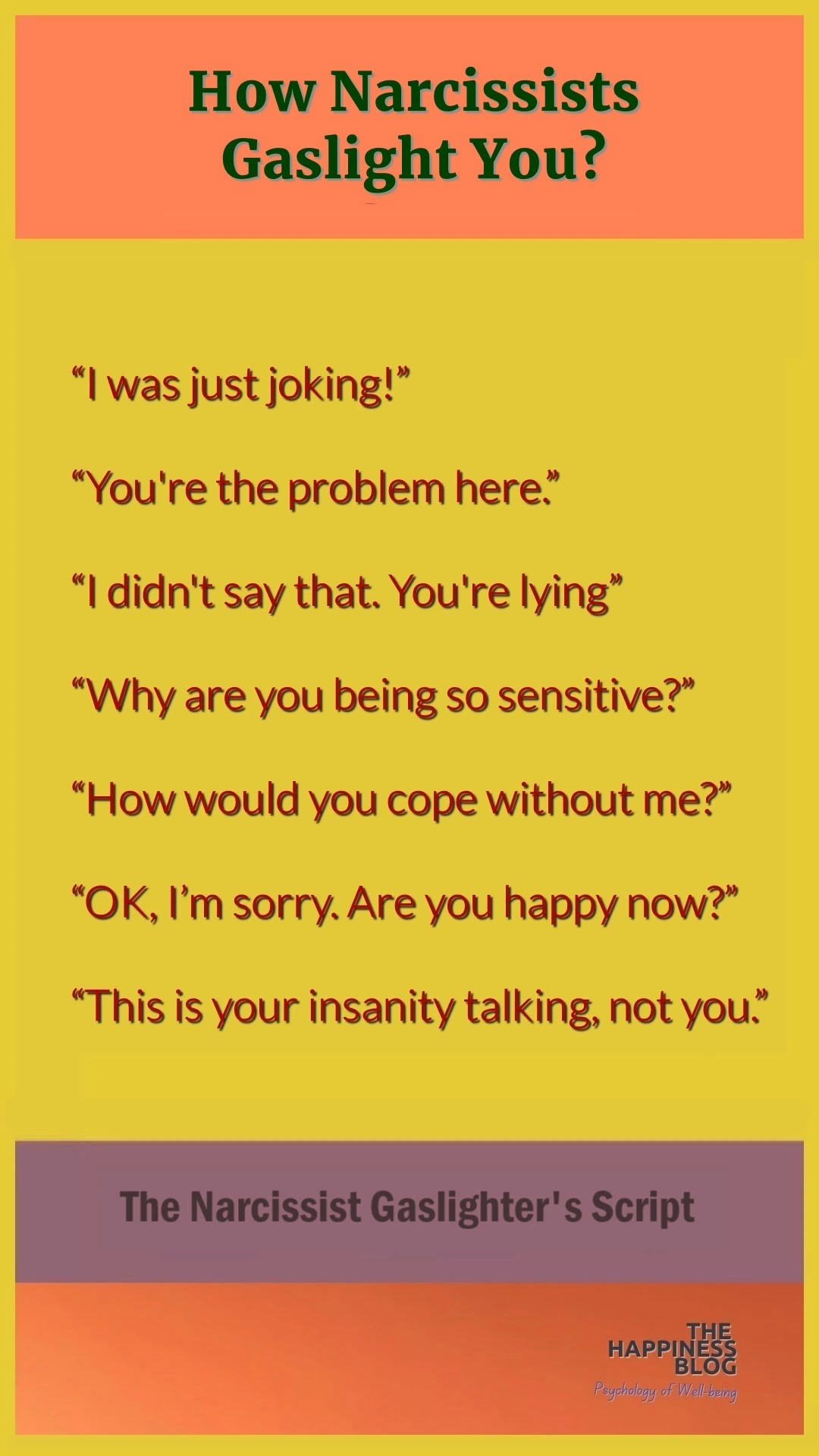
“Stop being so insecure.”
In a classic case of being caught cheating, the gaslighter flatly denies their involvement and transfers the blame to the victim, saying it’s their insecurity that’s making them imagine the act as cheating.
“Stop being so paranoid.”
It strengthens the gaslighter’s argument that the victim is losing touch with reality.
This creates an increasing sense of overdependence on the narcissist. The victim starts to believe that their abuser knows how to keep them safe and in touch with the real world.
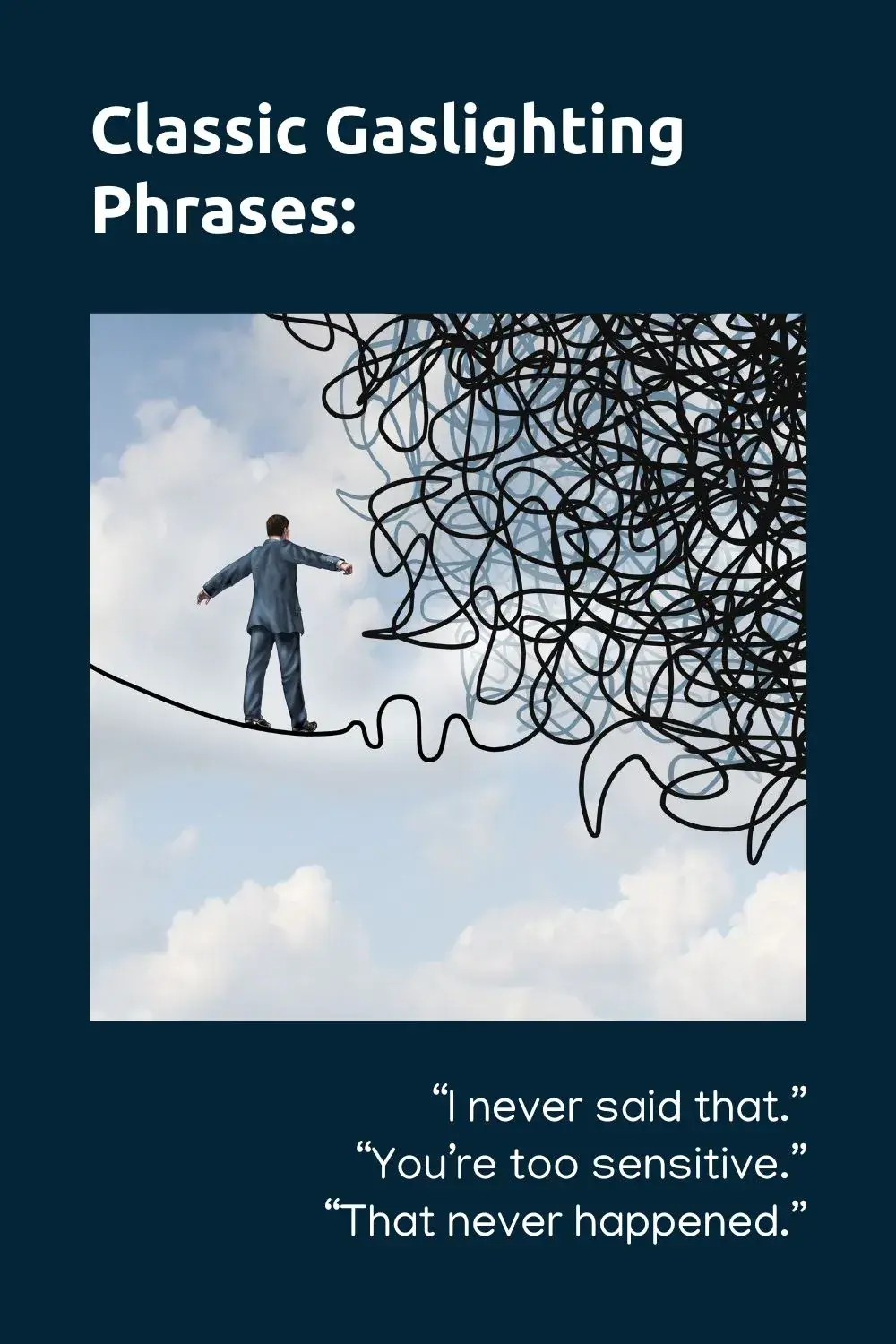
“Stop being so dramatic.”
Gaslighters use this phrase to help convince victims that their concerns and reactions are overblown, while the issue is trivial. This is a direct assault on the reasoning capacities of the victim.
“You’re imagining things.”
A victim may get to hear their partner repeat this (“You’re imagining things” or “You’re making this up”) if they have narcissistic personality traits. This is one of the most frequent expressions used by narcissists.
They may be prone to using their denial as a means of defense. As a result, they may coerce the victim to change their view of a situation.
“Just stop thinking about it!”
That phrase openly accuses the victim of overthinking and being unable to stop the train of thought in their mind.
Another variation of that phrase could be, “Why do you keep overthinking so much?”

“It sounds like you don’t trust me.”
It is one of the more direct gaslighting phrases used by abusers to shift blame away from themselves and onto the victim.
They will frequently claim that the situation was a misunderstanding because of a lack of trust by the victim in them, and this phrase is their way to get away with it. They may add that the victim needs to rebuild trust in the relationship.
“Stop trying to act like such a victim!”
It tells the victim that they are acting like a victim!
What this statement does is make the victim being reluctant to share their doubts and ordeals with others, since they may start to think she/he is behaving like a victim while they are not.
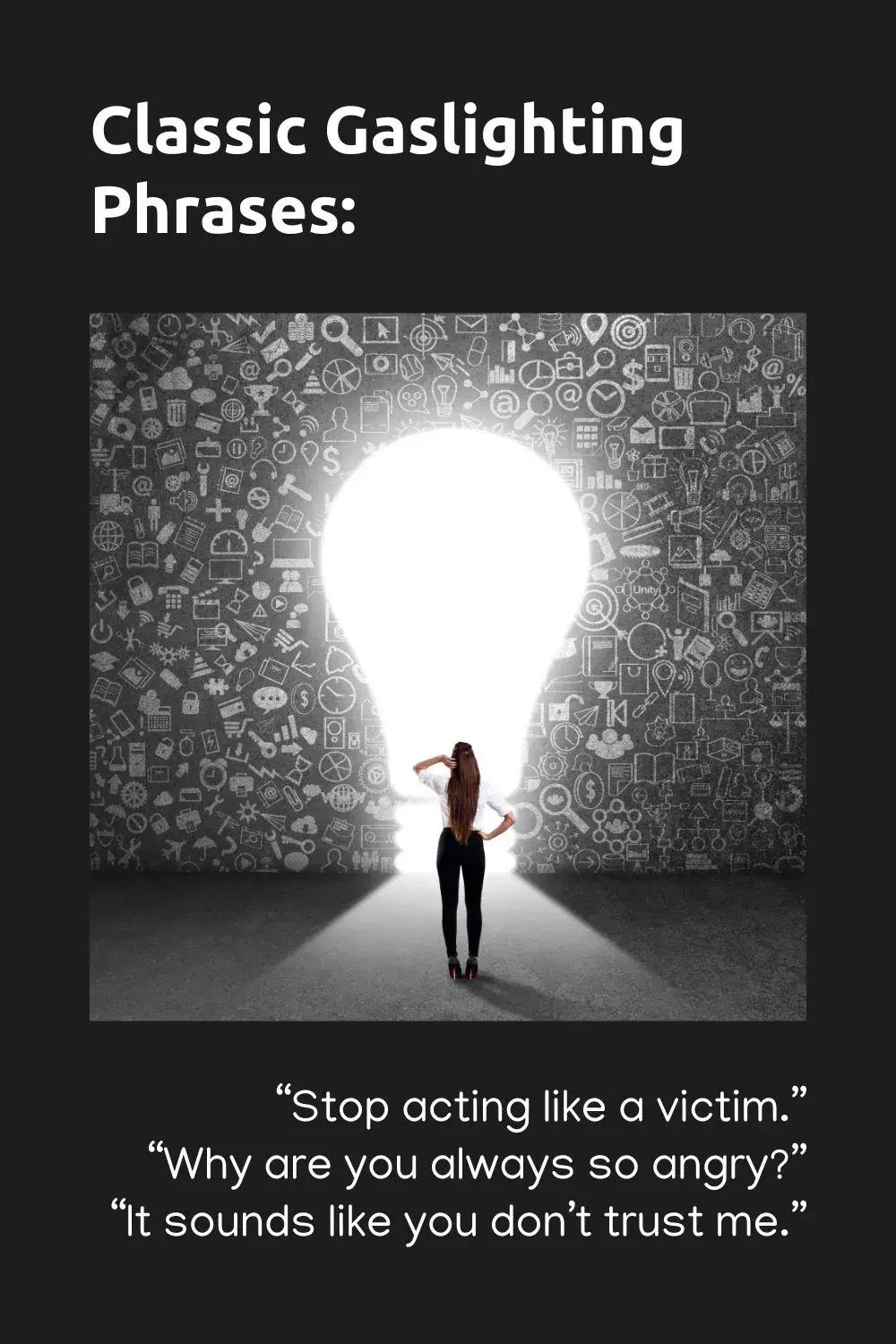
“Calm down and just drop it already!”
This aims to underplay the surge of emotions the victim is experiencing. This negates the emotional climate in the victim’s mind, and asks them to do the same.
It tells them that they are unnecessarily making mountains of a molehill by overreacting, such as getting angry or aggressive.
“Why are you always so angry at me?”
To be honest, that can be an accurate statement, because the victim spends much of their day confused about what is right and wrong, causing them to have a constant low level of anger.
That sentence makes the victim realize that being angry all the time is wrong. If they are not angry, they will hold themselves accountable for angry reactions even before they occur.
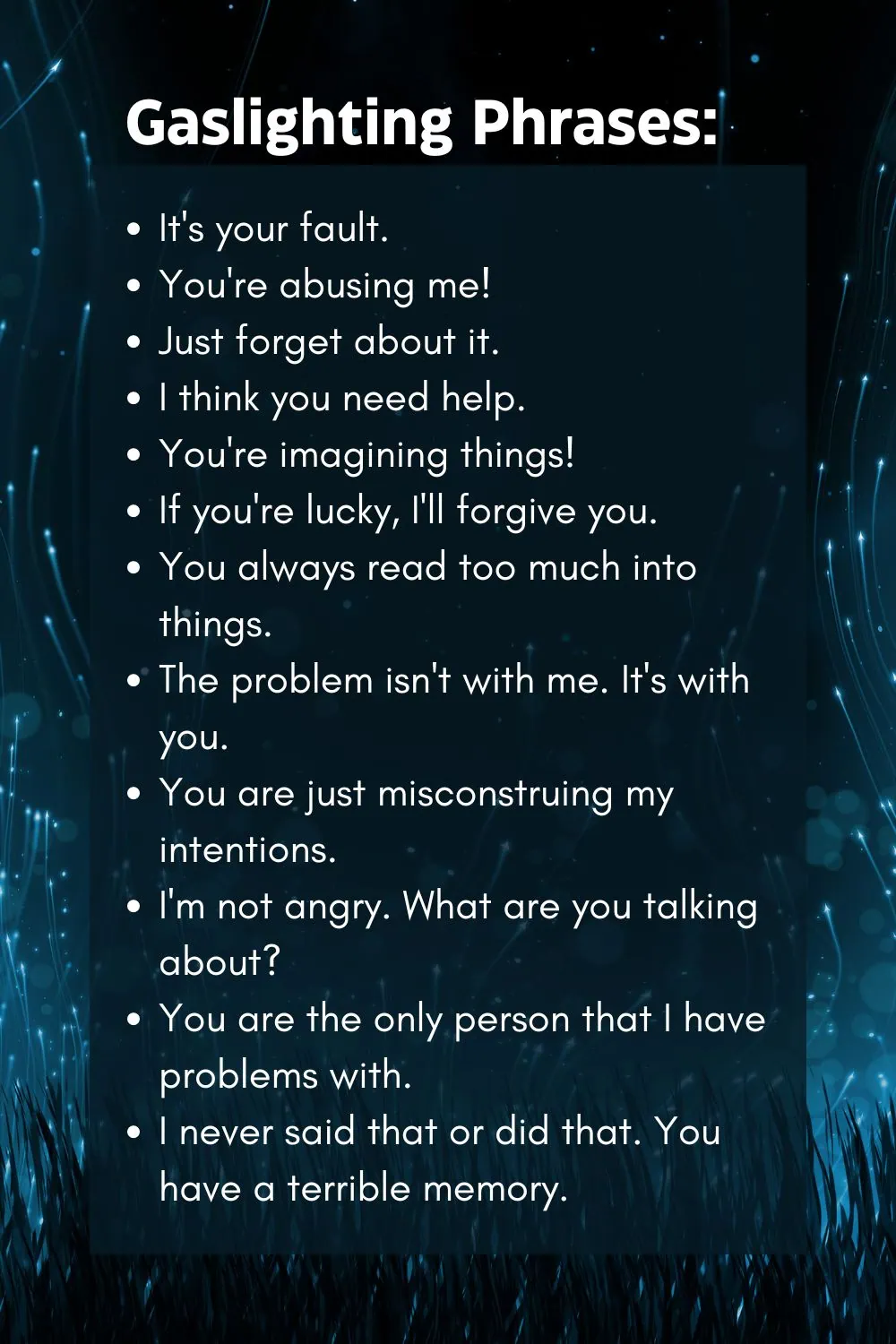
More Gaslighting Phrases
- “How many times do I have to tell you?”
- “What do you want me to do about it?”
- “Stop exaggerating. It wasn’t all that bad.”
- “You’re not allowed to have your own opinion!”
- “Your mind seems off. You desperately need help.”
- “What are you talking about? That never even happened!”
- “I was joking. Why can’t you take a joke like a normal person?”
- “I don’t want to talk about this anymore. It upsets you too much.”
- “After all, it’s entirely your doing. When are you going to get this?”
- “You know that’s not what you meant, so stop pretending like it is!”
- “You can’t do it on your own anymore. You must ask me before making any decision.”
- “You don’t even know how to feel an emotion properly. You should be feeling sorry, not angry.”
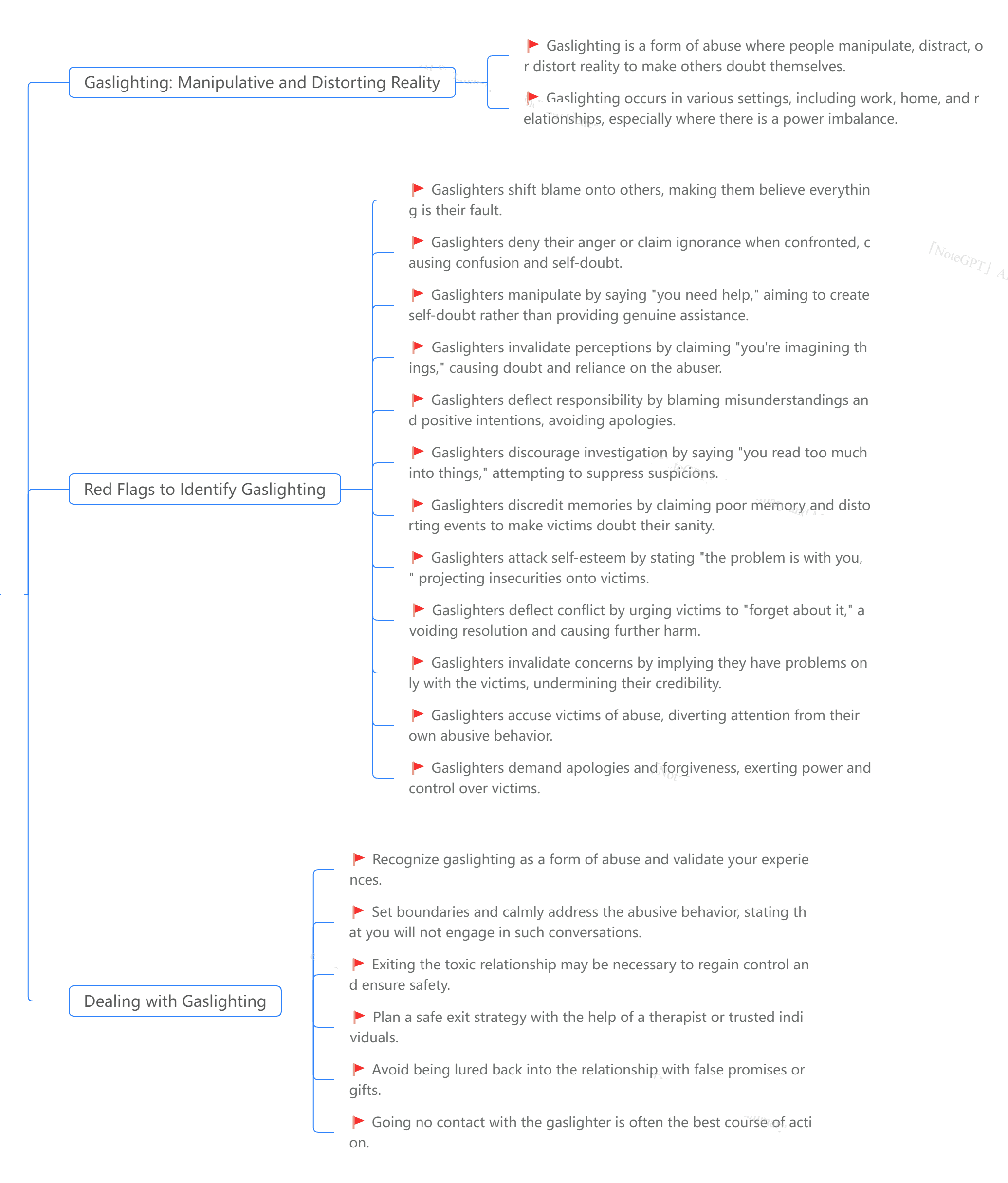
How Do Gaslighters Manipulate Their Victims?
The classic gaslighter works his/her way through the victimization process as:
- Insisting that the victim repeatedly makes the same mistakes (when they don’t).
- Labeling their victim’s emotions as inappropriate, irrational, and out of the place.
- Branding their feelings as overreactions and dramatization of the situations.
- Isolating them as the main part of the problem when they are confronted.
Any gaslighter’s ultimate goal is to take control of their victim’s mind, making them dependent on them for every decision. Though it takes time, once successful, the victim becomes fixated on the gaslighter for emotional support and intellectual approval.
Final Words
A classic example of gaslighting:
– A gaslighter gets caught in an immoral act, like cheating.
– First, they deny it. “You saw it wrong! It never happened”!
– Then, when you say others saw it too, they say, “They are feeding you lies; stay away from them.”
Gaslighting can also be carried out by a large group working together. I believe Edward Snowden and Aaron Swartz are modern-day victims of coordinated gaslighting by several governmental agencies.
Some movies with a “gaslighting” theme:
- The 1944 movie Gaslight, which gave us the term. The husband secretly dimmed all the gaslights in the house. When the wife complained, he said she was imagining it. This is to convince her and others that she is insane.
- The 2016 film “The Girl On The Train” had the wife being gaslighted by her husband for so long that she could not trust her own judgment if she had murdered someone.
- Another similar-themed film was 2014’s “Gone Girl,” which had the wife hauntingly gaslighting the husband.
Gaslighting is common among sociopaths and narcissists. Both are masters at convincing their victims to believe their version of the events.
√ Also Read: 8 Signs of A Toxic Friendship & How To Handle Them
√ Please spread the word if you found this helpful.
